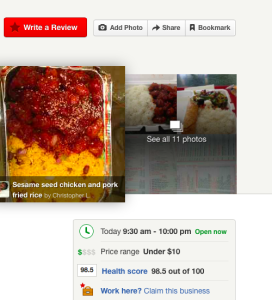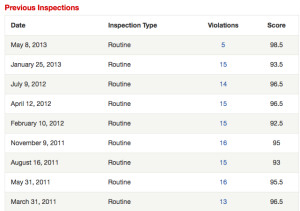It’s not often that I’m on the cutting edge of anything. When I am it’s usually because of some association or coincidence. Doug got me into Apple products; Dani’s interest in Instragram spawned #citizenfoodsafety; Don Schaffner’s nerdy coolness got me into podcasting.
I’m really just a poser, and lucky that I hang out with cool people.
And again, by association, I live in a place where my local health department is showing how progressive it is by partnering with Yelp to get inspection results to the masses.
According to the Cary Citizen, the good folks at Wake County Public Health including my friend Andre Pierce have decided to go to where people are already making dining decisions and integrate their info into mix. Clicking on the health score box shows the current inspection results as well as every inspection in the database (going back to 2011). Better than just the score, users can see all the violations and make their own decisions based on all the available risk information.
In a pioneering effort, Wake County is now publishing data about restaurant inspection scores on the social review website Yelp.
The Wake County CIO, Bill Greeves, learned of the Local Inspector Value-entry Specification (LIVES) pilot program at a leadership conference and recognized this as an example of transparency in government. Wake County already had the restaurant inspection data available. Being able to share this data with an audience that might be interested in it in the best way possible seemed like a natural fit.
 “Providing easier access to that information is really what it’s all about,” said Greeves.
“Providing easier access to that information is really what it’s all about,” said Greeves.Greeves gathered a small team including Andre Pierce, Angela Strickland and Chris Mathews to investigate and implement this exciting new approach to sharing restaurant inspection data. The team worked directly with the technical and marketing personnel at Yelp to develop the necessary data extracts. Some data was in dissimilar formats or had to be scaled to match the levels of the LIVES standard. Chris Mathews explained the value of this data standard:
“LIVES affords the ability of scores across separate jurisdictions to mean the same thing – a score of 93 in Raleigh means the same thing as a 93 in San Francisco”.
Within six weeks, Wake County was ready to publish the restaurant inspections on Yelp. A launch strategy was planned including local news and social media to announce the availability of Wake’s health scores on Yelp.


